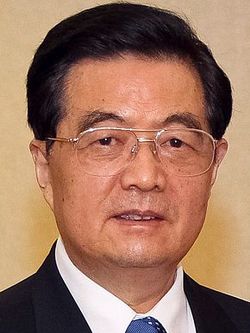
173 cm
Hu Jintao (born 21 December 1942) is a Chinese retired politician who served as the general secretary of the Chinese Communist Party (CCP) from 2002 to 2012, the president of China from 2003 to 2013, and chairman of the Central Military Commission (CMC) from 2004 to 2012. He was a member of the CCP Politburo Standing Committee, China's de facto top decision-making body, from 1992 to 2012. Hu was the fifth paramount leader of China from 2002 to 2012.
Hu rose to power through the Chinese Communist Party (CCP), notably as Party Committee secretary for Guizhou province and the Tibet Autonomous Region, where his harsh repression of dissent gained him attention from the highest levels. He moved up to first secretary of the CCP Central Secretariat and vice president under CCP general secretary Jiang Zemin. Hu was the first leader of the Communist Party from a generation younger than those who participated in the civil war and the founding of the republic. Influential sponsors from the older generation promoted his rapid rise, including Song Ping, Hu Yaobang, Deng Xiaoping, and Jiang Zemin.
During his term in office, Hu reintroduced state control in some sectors of the economy that were relaxed by the previous administration, and was conservative with political reforms. Along with his colleague Chinese premier Wen Jiabao, Hu presided over nearly a decade of consistent economic growth and development that cemented China as a major world power. He sought to improve socio-economic equality domestically through the Scientific Outlook on Development, which aimed to build a "Harmonious Socialist Society" that was prosperous and free of social conflict. Under his leadership, the authorities also cracked down on social disturbances, ethnic minority protests, and dissident figures, which also led to many controversial events such as the unrest in Tibet and the passing of the Anti-Secession Law. In foreign policy, Hu advocated for China's peaceful rise, pursuing soft power in international relations and a corporate approach to diplomacy. Throughout Hu's tenure, China's influence in Africa, Latin America, and other developing regions increased.
Hu possessed a modest and reserved leadership style. His tenure was characterized by collective leadership and consensus-based rule. These traits made Hu an enigmatic figure in the public eye. His administration was known for its focus more on technocratic competence. At the end of his tenure after ten years in office, Hu won praise for retiring voluntarily from all positions. He was succeeded by Xi Jinping. Following the death of his predecessor Jiang Zemin, Hu is the only living former paramount leader of the People's Republic of China.
Source : Wikipedia